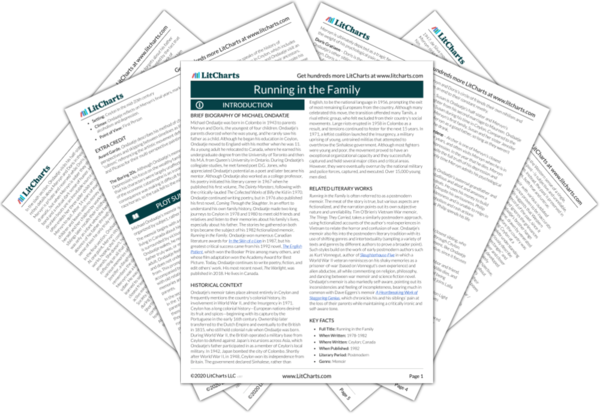Ceylon (modern-day Sri Lanka) has a long history of colonialism. Between 1505 and 1948, the Portuguese, Dutch, and English Empires each ruled the country in turn, and Ondaatje regards these nations as “invaders who stepped ashore and claimed everything with the power of their sword or bible or language.” Although the various European powers reigned over Ceylon and although some of their citizens married Ceylonese people—Ondaatje’s family has some Dutch heritage—Ondaatje argues that none of them truly understood Ceylon or appreciated it for anything more than its aesthetic beauty and exportable resources. Both through English writings and family dialogue, Ondaatje exposes the shallowness of the colonialists’ love for Ceylon and suggests that a country can only truly belong to the people who were born there, since only they recognize its true value.
Ondaatje intersperses his personal narrative with snippets written by European artists and explorers espousing Ceylon’s natural beauty while reviling its people, suggesting that the colonialists’ love for Ceylon is shallow, concerned only with aesthetic beauty and goods that can be traded for profit. Ondaatje states that Ceylon’s beauty “seduced all of Europe,” particularly the Dutch, Portuguese, and English empires. He includes writings from the English artist Edward Lear stating, “The roads are intensely picturesque. Animals, apes, hornbill, squirrel, and figurative dirt,” suggesting that the Europeans saw Ceylon’s value primarily in its exotic aesthetic appeal. However, in the same breath, Lear calls the native people “odiously inquisitive and bothery-idiotic” and “savages,” demonstrating that despite their love of the country’s scenery, the colonizers had no appreciation for its people or their culture. Similarly, Ondaatje states that European traders saw Ceylon as a “paradise to be sacked. Every conceivable thing was collected and sent back to Europe.” The colonizers’ main concern seemed to be stripping the resources out of Ceylon to send back to Europe, suggesting that their infatuation with the country was primarily for the beauty or resources they could remove from it.
Despite the Europeans’ love for Ceylon’s beauty and resources, they never learned to live within the country’s harsh climate or respect the ways of the culture, suggesting that the Europeans never actually understood the land they tried to rule. Ondaatje notes that the heat “drove Englishmen crazy,” such as the English writer D.H. Lawrence, who wrote “Ceylon is an experience—but never a permanence.” Although Ceylon may have looked like paradise, it seemed unlivable to Lawrence as an Englishman. Ondaatje further notes that as the Europeans encroached into his country, “the island hid its knowledge [… its] arts and customs and religious ceremonies.” Instead, the country “pretended to reflect each European power until newer ships arrived and spilled their nationalities.” Aside from one sailor held captive in the Ceylon for 20 years, “very few foreigners truly knew where they were.” This further suggests that although various European powers tried to rule over Ceylon, they never understood what it was they were ruling or how to thrive there, but rather “stepped in and admired the landscape, disliked the ‘inquisitive natives’ and left.”
Ondaatje’s critical description of the colonizers and their unwillingness or inability to see Ceylon as more than scenery or profit suggests that a country belongs only to those born and who’ve lived there all their lives, who can appreciate the nation for all it offers and endure its environment. Reflecting on the flow of colonial powers and foreigners through Ceylon’s past, Ondaatje decides, “We own the country we grow up in or we are aliens and invaders,” suggesting that the only people with any right to live in Ceylon or enjoy its beauty are those who understand its culture and traditions, and who can endure its harsh environment. Beyond Ceylon, Ondaatje’s pronouncement seems an indictment of all such colonial pursuits or people who seek to exploit a place’s beauty without understanding and respecting it completely. However, this does place Ondaatje himself in an odd position. Having moved to England at age 11 and lived in Canada for most of his life, he finds that he himself partially feels like a foreigner in his own home: “I am the foreigner. I am the prodigal who hates foreigners.” However, Ondaatje’s childhood in Ceylon and his commitment to understanding its past and the minutiae of its environment—as illustrated by his detailed sensory descriptions—distinguishes him from the foreign colonizers who simply wanted to exploit Ceylon’s resources and steal away the country’s beauty for themselves.
Colonialism ThemeTracker

Colonialism Quotes in Running in the Family
On my brother’s wall in Toronto are the false maps. Old portraits of Ceylon. The results of sightings, glances from trading vessels, the theories of sextant. The shapes differ so much they seem to be translations […] growing from mythic shapes to eventual accuracy.
I am the foreigner. I am the prodigal who hates the foreigner.
Ceylon always did have too many foreigners…the “Karapothas” as my niece calls them—the beetles with white spots who never grew ancient here, who stepped in, admired the landscape, dislike the “inquisitive natives” and left.
Don’t talk to me about Matisse
[…]
Talk to me instead of the culture generally—
How the murderers were sustained
by the beauty robbed of savages: to our remote
villages the painters came, and our white-washed
mud-huts were splattered with gunfire.











